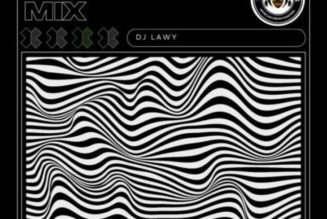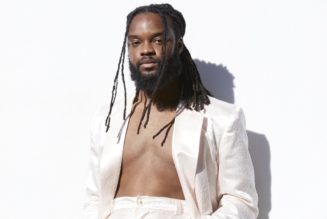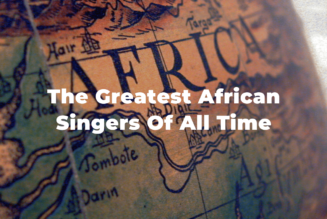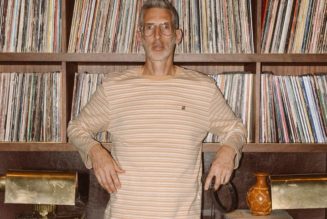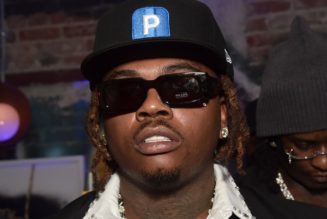
By Beau Hayhoe
A curious thing happened right before Big Red Machine announced its new album, How Long Do You Think It’s Gonna Last? (out today on 37d03d/Jagjaguwar). As the social accounts of the indie folk duo (The National’s Aaron Dessner and Bon Iver’s Justin Vernon) flickered to life, one could sense larger forces at play.
Rumors buzzed on Reddit, tweets took off, and speculation reached a fever pitch surrounding the mysterious woman in visual promos. Eventually, eagle-eyed fans were rewarded handsomely. Big Red Machine whirred to life, featuring Dessner’s reunion with Taylor Swift on the heels of her two stellar 2020 releases he produced. Swift sings on “Birch” and “Renegade,” and the 15-track album (recorded in spurts dating to spring 2019) is carried by a cavalry of capital-I indie stars.
Plug into Big Red Machine and you’ll hear Robin Pecknold of Fleet Foxes, singer-songwriter Ben Howard, Dessner friend Sharon Van Etten, and Hadestown composer and mastermind Anaïs Mitchell, among others. As unlikely and astounding as it seems, How Long Do You Think It’s Gonna Last? has brought together a legion of global fans, a pop superstar, and a brigade of introspective indie heroes. The result is one of the year’s most anticipated releases.
Dessner said there was “no master plan,” and the album took shape from song fragments and snippets over time. It’s expansive, beautiful, and intriguing with each listen.
“You don’t know the life something will take on or what it will mean in the future,” Dessner told MTV News over Zoom from France, describing the intricate beats, pulses, and song snippets that eventually formed the album. “It can shift and take on unexpected meaning somehow through collaboration and… when you bounce ideas off people. And that’s really the story of Big Red Machine: It’s serendipity and friendship and community.”
That sense of togetherness was epitomized by the album announcement in late June, sparking enthusiastic, fan-driven chatter seemingly carried over from last year’s Swift-Dessner partnership on Folklore and Evermore.
“Having these worlds collide for me was super unexpected but probably one of my favorite things to ever happen in music,” said Stephen Ossola, a fan of Swift, The National, and Bon Iver. “I feel like it’s just the beginning of more great work we’re about to see, including the Big Red Machine collabs.”
For a genre-bending indie folk album to unite fans of stadium pop and elegant, somber indie rock is a true rarity. There’s a lot to love, whether you’ve memorized Swift’s chart-topping hits or prefer Dessner’s virtuosic guitar work with The National.
“Before Folklore and Evermore, seeing Taylor Swift’s name on a Big Red Machine album would’ve been jarring for me, but now, I find myself listening to ‘Renegade’ on repeat,” Australia-based Twitter user and The National fan David Lewis said.
The new Big Red Machine album is not unlike a musical version of an ensemble blockbuster (or sleeper indie hit, perhaps). There’s also a direct through line from Broadway to Big Red Machine via Mitchell. She tapped the Bon Iver founder to sing on Hadestown’s original studio recording in 2010, a fascinating bit of Big Red Machine trivia.
Be it teaming with longtime pals like Mitchell or newer collaborators like Swift, Dessner and Vernon have emphasized partnerships for more than a decade, from compilation albums to improvised festival appearances. The name of the project itself is rooted in collaboration. It hails from a ghostly song sketch first shared between the duo as Dessner worked on the famed late-aughts indie compilation Dark Was the Night, on which Vernon notably appears.
“I think of it as a web, really,” said Laura Cameron, a Cincinnati-based fan. “You can see the threads if you look through the liner notes.”
These intricate strands shine through on the album’s third track, “Phoenix.” One glance at its YouTube comments section reveals diverse fan support, and that’s an understatement.
A double-bill Fleet Foxes and Bon Iver show a decade ago in Phoenix (naturally) brought together Pecknold and Vernon, serving as the inspiration behind the pastoral, Grateful Dead-esque offering. Pecknold had followed Vernon’s ascent from underground folkie to indie stardom (and beyond) prior to the show. Over the phone from New York City, he remembered the brief backstage chat felt “like five minutes with the guru at the top of the mountain.”
On “Phoenix,” Pecknold — with Mitchell assisting on writing and singing duties — recalls the sensation of “being in the same boat at the same time” as Vernon in navigating the music industry. “The track had the room for that reflection or that kind of frame,” Pecknold said of the deeply collaborative song. He even worked at Dessner’s famed Long Pond studio while making the 2020 Fleet Foxes album Shore. “If you’re asking the right person to do the right thing, it can be so much better than anything you could come up with by yourself.”
Shea Garner, a member of the Fleet Foxes Reddit community, was delighted if initially surprised to hear Pecknold. “I see him as an artist who tends to stay in his own lane,” Garner said. “He’s clearly trying to expand his sound and reach.”
“Phoenix” has Pecknold brainstorming ways to bring other voices into as-yet-unfinished Fleet Foxes songs, he added. In the meantime, Big Red Machine has room for helping hands aplenty, including singer-songwriter Mitchell (lead single “Latter Days” was the first track Dessner sent to her).
“I think it just really made sense to us that she would be a big part of this,” Dessner said. “There are lots of threads between us all, that’s the thing.”
Mitchell, a regular collaborator, previously crossed paths with Dessner at Vernon’s Eaux Claires festival, which he first staged in 2015. “I think one of the things Aaron, Justin, and Big Red Machine do best is make the music world feel small and interconnected,” Mitchell said via email. “Never in a million years did I think I’d work on a record with Taylor Swift. I love the tearing down of genres and the, like, territorialism that comes with them.”
Mitchell lent her vocals to a stirring late-night TV performance of “New Auburn” earlier this month, saying the track, which reminded her of growing up in Vermont in the 1980s, “felt very familiar.”
Other than Instagram Live sessions and a 2021 Grammys performance, it was Dessner’s first audience-facing onstage appearance in nearly two years. He called the experience “moving.” Seeing these songs played live is undoubtedly a fitting encapsulation of the deeply nostalgic, interconnected, poignant album.
Big Red Machine is sitting on a wellspring of similarly emotional ideas, and earlier this month, Dessner and Vernon started working on three new songs. The road to the next Big Red Machine album is already being paved, and the band will certainly have lots of support from friends and fans along the way. “One of my favorite things about music is when you just make music and you’re not sure what it is,” Dessner said. ”They kind of just appear. It just sort of happens.”




